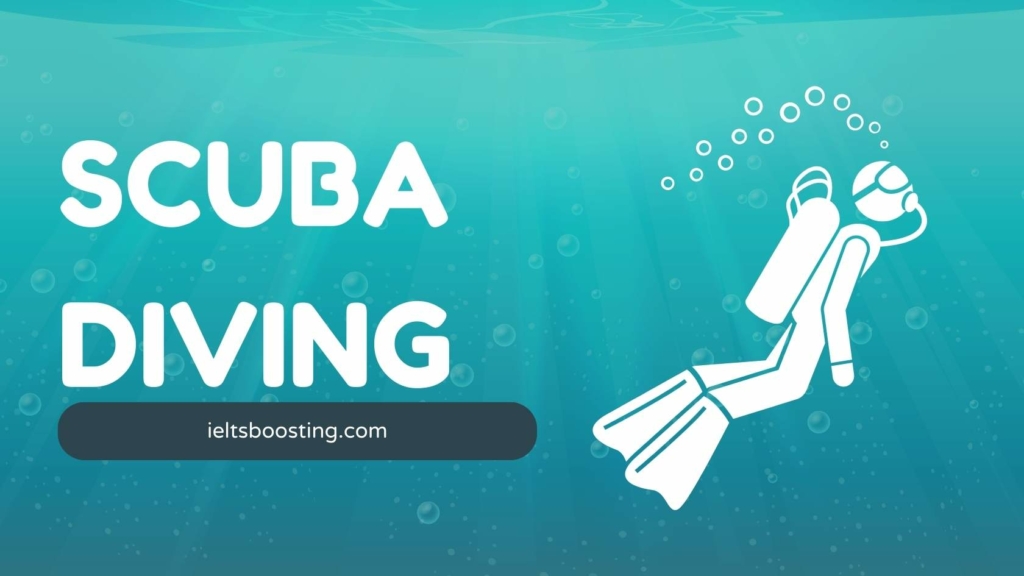Describe a water sport
You should say:
● What it is
● Where you would like to try it
● Whether it is difficult
● And explain why you would like to try it
Sample answer to describe a water sport
When I think of a water sport that really captivates my interest, scuba diving is the first thing that comes to mind. It’s not just a sport; it’s an adventure into a different world, a world beneath the waves, teeming with life and color.
The place where I’d love to try scuba diving is Phu Quoc Island in Vietnam. I’ve heard and read so much about the crystal-clear waters and the vibrant marine life there. It’s like an underwater paradise, with coral reefs and an incredible variety of fish. The idea of diving there, exploring the depths, and seeing the ocean’s wonders up close is just exhilarating.
As for the difficulty, I believe scuba diving does require a certain level of skill and training. It’s not something you can just dive into without proper preparation. You have to learn how to use the diving gear, understand safety procedures, and get comfortable with being underwater for extended periods. But that’s part of the appeal for me. The challenge of learning something new, of stepping out of my comfort zone, is really exciting.
And why do I want to try scuba diving? Well, it’s about the unique experience it offers. It’s one thing to see the ocean from a beach or a boat, but it’s entirely different to be in the water, to be part of that underwater world, even if just for a while. It’s like you’re entering a completely different realm, one that’s peaceful, beautiful, and incredibly humbling. You’re not just observing life down there; you’re part of it, even if temporarily.
Also, I think scuba diving would give me a new perspective on the importance of ocean conservation. Seeing marine life and coral reefs up close would undoubtedly deepen my appreciation for these ecosystems and the need to protect them.
Gộp phú quốc island vào để nói về interesting place, car trip, beautiful place…
Explore more: ielts speaking part 2
Part 3-Describe a water sport
What are the advantages of water transportation?
Water transportation has several advantages. Firstly, it’s incredibly efficient for transporting large quantities of goods over long distances, offering a cost-effective solution compared to air or land transport. Secondly, it’s environmentally friendlier, as ships generally have a lower carbon footprint per ton of cargo than trucks or planes. Plus, for certain remote areas accessible only by water, it’s a vital lifeline, ensuring the delivery of essential supplies and connectivity.
Advanced Vocabulary:
- Cost-effective solution: An economical and efficient method of achieving a goal or completing a task.
- Vital lifeline: An essential means of maintaining or providing something crucial for survival or success.
Phrase Verb:
- Ensuring the delivery: Guaranteeing or making certain that goods are transported and reach their intended destination.
Why do people like to live near water?
Many people love living near water because of the stunning views and the calming effect water often has. There’s something about being near a river, lake, or ocean that can be really relaxing and therapeutic. Plus, living near water often means easy access to water-based activities like swimming, fishing, or boating, which can be a big draw for outdoor enthusiasts.
Advanced Vocabulary:
- Therapeutic effect: A healing or beneficial influence on the body or mind.
- Outdoor enthusiasts: People who enjoy and actively engage in outdoor activities.
Phrase Verb:
- Big draw: A major attraction or appeal.
What kinds of water sports are popular nowadays?
Water sports like kite surfing and wakeboarding are really catching on these days, attracting thrill-seekers for their high-energy and dynamic nature. Scuba diving continues to be popular, especially for those interested in exploring underwater worlds and marine life. And then there’s sailing, which has a timeless appeal for those who love the combination of skill, strategy, and the open sea.
Advanced Vocabulary:
- Thrill-seekers: People who are looking for exciting and adventurous activities.
- Timeless appeal: A lasting attraction that does not diminish over time.
Phrase Verb:
- Catching on: Becoming popular or fashionable.
Do you think it is good to teach swimming in schools?
What do you think of the people who waste water?
I think people who waste water might not fully understand the significance of conserving this vital resource. With water scarcity becoming an increasingly pressing global issue, it’s essential to be mindful about usage. It’s important for everyone to recognize the impact of their actions and try to adopt water-saving practices, ensuring this precious resource is preserved for future generations.
Advanced Vocabulary:
- Water scarcity: The lack of sufficient available water resources to meet the demands of water usage within a region.
- Mindful about usage: Being conscious or aware of how much is being used or consumed.
Phrase Verb:
- Adopt water-saving practices: To start using methods or habits that lead to using less water.
What are the characteristics of goods transported by water?
Goods transported by water typically include bulk and heavyweight items, like raw materials, oil, and large machinery, which are impractical to move by air or road. Water transport is ideal for these due to its high cargo capacity and cost-effectiveness for long distances. Additionally, perishable items are often shipped in refrigerated containers, ensuring they stay fresh during their journey.
Advanced Vocabulary:
- Cargo capacity: The maximum amount or volume of goods that a vessel can carry.
- Cost-effectiveness: The effectiveness of something in relation to its cost, especially regarding good value for money.
Phrase Verb:
- Shipped in: Transported or sent by a particular method or on a particular route.


